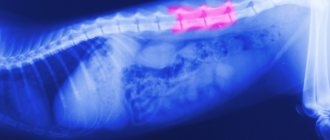Author of the article: Dmitry Boyko | Updated: 12-09-2020
Small dog breeds are extremely popular today among both celebrities and ordinary people. However, the lifestyle they are often forced to lead can have a negative impact on the animals' health. Dogs, like people, suffer from colds, coughs, allergies, gastrointestinal diseases and others. Miniature Chihuahua dogs, frequent companions of women, are often at risk due to improper care. In this article, we will introduce you to the signs of Chihuahua disease and treatment methods.
Health Features of the Chihuahua Breed
Small animals are usually characterized by a frail constitution and a genetic predisposition to certain types of diseases. Like children, puppies have an open fontanelle after birth: the bones of the skull usually fuse together within the first four months. But there are dogs whose fontanel is open all their lives.
In this case, receiving any head injury is fraught with the death of the animal. The delicate physique of the Chihuahua indicates a rather weak skeletal system. This is why dogs often suffer from joint dislocations and fractures. It is necessary to protect your pet from falls, jumps and any household injuries. Hip dysplasia is also often diagnosed. Dogs are less susceptible to diseases of the cardiovascular system.
If a dog suffers from endocarditis, suffers from mitral valve disease or pulmonary stenosis, then such an individual is not allowed to reproduce. The diseased state of the animal is characterized by vomiting, diarrhea, loss of appetite, increased body temperature, discharge from the eyes, ears and nose, breathing problems and seizures, lethargy, itching and dandruff. When the first signs appear, it is better to immediately contact a veterinarian, otherwise the disease may worsen and complicate treatment.
Hydrocephalus
Chihuahuas are the only dogs that are born with an incompletely formed skull. They, like human newborn babies, have a fontanel. The cranial vault is finally formed only by three to four months of age. This feature predisposes the breed to hydrocephalus. It may also be due to heredity.
Chihuahuas are the only dogs that are born with an incompletely formed skull.
Symptoms of the disease are noticeable in puppies from two months. When choosing a puppy, pay attention if he often throws back and tilts his head, or becomes dizzy. Convulsions are possible.
Treatment is carried out only by a doctor. Drugs are needed to reduce intracranial pressure, and sometimes surgery.
Digestive system diseases
Chihuahuas, like other dogs, need a balanced diet: animal proteins, vitamins and microelements must be included. Dyes and preservatives are not allowed in food. You can buy special food, but it’s also easy to choose a diet for your pet.
The main thing is that the diet includes not only different types of meat, but also vegetables and grains. It is better to avoid bones for such dogs altogether, as they can cause constipation or even clog the esophagus. A monotonous diet also contributes to frequent constipation. Signs of this problem are the dog’s restless behavior, yelping, painful attempts to go to the toilet, few bowel movements, they are dry and dark in color. The following treatment is recommended: short fasting combined with plenty of fluids, castor oil.
Similar article: What types of Chihuahua mestizos exist and what is characteristic of them?
You can also use an oil enema. If the problem is caused by an object stuck in the intestines, you should immediately consult a doctor. Diarrhea in an animal can be caused by poor-quality food, poisoning or worms. In the case of diarrhea, there may be two options: a single attack does not require treatment, but if the problem bothers the dog for a long time, then the problem is in the diet. Change your diet and watch. The cessation of diarrhea is a sign that the menu needs to be changed, perhaps putting the pet on a diet.
In any case, diseases of the gastrointestinal tract are provoked by food that is not intended for the ears. Remember that candy, sweets, and smoked foods are not for the stomachs of dogs, as they are dangerous not only by poisoning and obesity, but also by the appearance of worms. If diarrhea is accompanied by vomiting, then, most likely, parasites have settled in the stomach. Helminths are very dangerous, so to combat worms you need to do deworming periodically.
Skin problems
| Disease | Symptoms | Causes | Treatment |
| Fleas | It is almost impossible to determine the presence of parasites visually; the main sign of their appearance is the behavior of the dog. The animal becomes nervous, constantly itches, and tries to bite fleas out of its fur. Often, inflammation and ulcers appear at the sites of bites, and hair falls out on them. | Fleas feed on the blood of dogs and live in their fur in search of food. The main source of infection is the street or contact with infected animals. |
|
| Atopic dermatitis | Similar to the symptoms of food allergies, but more often limited only to skin itching | A genetic disease characterized by susceptibility to environmental allergens (dust, pollen, mold, etc.) that can enter the body through the lungs or skin, bypassing the gastrointestinal tract | The only way to cope with atopic dermatitis is to choose a place for your pet to live with a minimum number of allergens. |
| Scabies |
| The causative agent of the disease is scabies mite | Treatment is prescribed by a veterinarian. It may consist of a course of injections or external agents - ointments, creams. The house must be thoroughly cleaned; the bedding on which the dog slept must be destroyed or at least disinfected |
| Hair loss | Unseasonal, heavy and uneven hair loss | This may be due to the dog overheating, frequent washing, stress and nervous condition of the pet, poor diet, lack of vitamins and minerals, liver, heart or kidney diseases, allergies, and the presence of parasites. |
|
What are the consequences of obesity?
Often, concerns about your pet's health come down to excessive nutrition. Chihuahua dogs are prone to obesity. Even if you do not know about the optimal weight standards for an animal, its appearance will tell you that the dog is sick. If a dog has no depression on its tummy, it is round and somewhat swollen, then this is a sure sign of obesity. The causes of the disease are commonplace: frequent snacking, excess carbohydrates in food.
The problem needs to be solved immediately. To begin with, reduce your consumption of foods containing large amounts of carbohydrates, increase your protein intake, and snacks should be counted towards your daily meal intake. As a result of obesity, an animal can develop diabetes, hypertension and other diseases. Excess weight can also cause tracheal collapse.
Tracheal collapse
Tracheal collapse can be either an acquired problem (due to obesity) or a congenital pathology, which can cause not only serious breathing problems, but also the death of the dog. Softening of the tracheal rings leads to its narrowing. With the development of the inflammatory process, mucus begins to accumulate in the trachea. The dog experiences attacks of suffocation, coughing, shortness of breath, and rapid breathing. The animal behaves restlessly and rushes about. The dog needs to be treated comprehensively: a special diet to eliminate obesity in parallel with medications to relieve inflammation. Timely treatment often allows the problem to be completely eliminated.
Related article: Why does diarrhea occur in Chihuahuas and how to treat them
Helminthic parasites
If the dog vomits or has diarrhea, it is possible that worms have settled in the Chihuahua's intestines. Thus, the animal’s body tries to get rid of them. To prevent this from happening, your Chihuahua needs to be dewormed every three months to get rid of worms.
To prevent your Chihuahua from developing health problems, you need to properly care for and feed the dog, and also periodically visit a veterinarian for consultations. Especially if there are suspicions of any diseases
How is your dog doing? Have you encountered the listed diseases and how did you overcome them?
If you liked the article, please share it with your friends.
Eye diseases
A characteristic feature of the Chihuahua is its large bulging eyes. Unfortunately, it is precisely because of this eye specificity that dogs often suffer from keratoconjunctivitis, glaucoma and cataracts. Keratoconjunctivitis is a serious inflammation that can lead to dryness of the eye mucosa. Lack of adequate treatment can lead to complete loss of vision.
Eye diseases can be identified by the following symptoms: the cornea becomes excessively red or, conversely, turns pale, the presence of tearful or purulent discharge from the eyes, ulcers, inflammation, swelling. The pet tries to scratch its eyes in any way. Your doctor will prescribe special eye drops; you can also wash your eyes with an infusion of strong tea. Access to the eyes must be isolated using a special collar. The special structure of the skull leads to the fact that after any kind of injury, a dog’s eyes may fall out. This cannot be done without the immediate help of a specialist.
Character
Chihuahuas are very lively, charming and intelligent dogs. They are devoted to their owners and tend to choose one favorite person out of all family members.
However, Chihuahuas not only give their love and attention, but also demand it in return. The inquisitive and inventive nature of these dogs allows them to come up with different ways to get as much attention as possible from their owners.
Owners of more independent dog breeds may find Chihuahuas too affectionate. Small children can easily injure this small dog, and the Chihuahua may bite a child in self-defense, so the Chihuahua is better suited for families with older children.
Due to its loyalty and bravery, the Chihuahua can provoke aggression from a larger dog, which can lead to severe injuries and even death due to the very small size of this dog.
These dogs are very suspicious of strangers and never lose sight of their owners. They say that Chihuahuas have the character traits of terriers; they are very vigilant, attentive, brave and even daring.
Dogs of this breed prefer the company of Chihuahuas to other dog breeds. That's why a Chihuahua's best canine buddy, after a human, is another Chihuahua.
These dogs are wonderful companions for older people or people with disabilities. Never leaving their loved one alone, they are able to lie next to their owner for many hours on end.
Sometimes Chihuahuas can be overly insecure and sensitive, which can lead to separation anxiety. It is known that dogs of this breed can bark for a long time and a lot if left alone for a long time. It is better not to get a dog of this breed if you are often away from home and cannot devote enough time to your pet.
Some dogs of this breed tend to be quite aggressive towards other dogs.
The Chihuahua's extremely loyal nature can be a problem, as these dogs can be very jealous. They may be jealous of their owner towards another person or animal.
The danger of epilepsy
Dogs also suffer from very unexpected diseases, such as epilepsy, which is caused by a malfunction of the brain. The animal experiences repeated uncontrollable seizures with loss of consciousness. The attacks are accompanied by convulsions, copious amounts of saliva, and involuntary bowel movements. The dog is looking for shelter, nervous. It can appear from nine months to three years. The disease is incurable, but attacks can be avoided with medication. You should consult your veterinarian regarding medications and dosage. Even minor seizures can affect a dog’s health, which may indicate the development of the disease.
How does an allergy manifest?
Chihuahua allergies can be triggered by a number of allergens: food, medicine, dust, hygiene products, etc.
The problem is solved by selecting hypoallergenic food and eliminating contact with the source of the allergy. If you cannot determine the allergen on your own, you need to consult a dermatologist. Allergies in Chihuahuas are manifested by the following symptoms: watery eyes, itching and redness of the skin, runny nose, coughing or sneezing, hair loss and dandruff. A runny nose can be caused not only by an allergic reaction: together with a cough, it indicates a cold; if with pus discharge, it means a fungal disease.
Disease susceptibility
Despite their miniature size and apparent fragility, Chihuahuas have fairly good health, especially among other decorative breeds.
At the same time, we must not forget about genetics, the likelihood of lack of proper care, anatomical features, etc. – factors that determine the predisposition of these dogs and puppies to certain diseases.
Most pathologies, subject to timely detection of symptoms and correct diagnosis, are treatable.
Dental diseases and their treatment
When a dog develops bad breath, plaque, and tartar, it has dental problems. Chihuahuas often suffer from pulpitis, caries and periodontitis. Therefore, do not put off visiting the dentist and do not neglect brushing your pet’s teeth. Dogs also suffer from colds. To do this, it is not necessary to walk the dog in extreme cold; a cold can appear even due to swimming or a draft. If your animal has a cold, do not self-medicate, seek advice. The veterinarian will prescribe antiviral medications and tell you how to keep the dog.
Chihuahua gets sick: what to do
At the first sign of illness, do not panic. It is necessary to provide the pet with peace by isolating it in a separate room. Remove sources of noise and curtain the windows so that bright light does not irritate or interfere with sleep. Provide the animal with a comfortable temperature and absence of drafts in the room. If the dog refuses to eat, you should not insist on feeding, but you need to monitor the amount of water he drinks. Walking time is reduced, and if necessary, sneezes are left at home. If his condition worsens, you should seek help from a veterinary clinic, where a doctor will evaluate the symptoms and prescribe treatment.
Disease Prevention
Taking care of your pet's health and prevention will help prevent Chihuahua diseases. You need to follow some simple rules:
- do not expose your pet to hypothermia, otherwise not only a cold may appear, but also problems with the lungs;
- try to protect your dog from falls, jumps from heights, mechanical and household damage, which can cause problems with bones and joints;
- take care of adequate physical activity for your pet; you need to keep your dog occupied only with feasible exercises;
- nutrition is the root of the problem of many diseases, so watch your dog’s diet;
- do not neglect caring for your pet’s teeth;
- Do not forget that timely contact with a veterinarian can save the dog’s health and life.
Always remember that you are responsible for those you have tamed. Carefully monitor your pet's well-being, and you can protect it from dangers and diseases.











